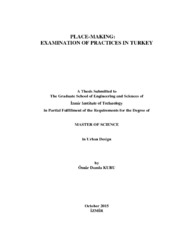Please use this identifier to cite or link to this item:
https://hdl.handle.net/11147/4562Full metadata record
| DC Field | Value | Language |
|---|---|---|
| dc.contributor.advisor | Saygın, Nicel | - |
| dc.contributor.author | Kuru, Ömür Damla | - |
| dc.date.accessioned | 2016-04-27T11:43:53Z | |
| dc.date.available | 2016-04-27T11:43:53Z | |
| dc.date.issued | 2015-10 | - |
| dc.identifier.citation | Kuru, Ö. D. (2015). Place-making: Examination of practices in Turkey. Unpublished master's thesis, İzmir Institute of Technology, İzmir, Turkey | en_US |
| dc.identifier.uri | http://hdl.handle.net/11147/4562 | - |
| dc.description | Thesis (Master)--Izmir Institute of Technology, City and Regional Planning, İzmir, 2015 | en_US |
| dc.description | Includes bibliographical references (leaves: 174-183) | en_US |
| dc.description | Text in English; Abstract: Turkish and English | en_US |
| dc.description | xii, 183 leaves | en_US |
| dc.description.abstract | Place-making is an approach which represents a comprehensive framework in building public places with a major concern of assigning functions in an ongoing process. The major point that place-making distinguishes from the former approaches is underlining the process of making instead of the certain product of design. This thesis is a descriptive study which aims to explain the making process of contemporary practice in Turkey. The perceptions of privacy and publicness concepts in Turkish Culture are different than they are in Western Culture. These two cultures are similarly affected by recent movements against top-down policies which lead commodification of commons. Pressures cause reactions such as Wall Street Occupation and Occupation of Tahrir Square. When we consider Turkey, we see that the place-making process is driven by NGOs and platforms that advocate right to the city similar to worldwide movements. In this thesis place-making process in Turkey is introduced with its traditional background and its contemporary break through. Three types of bottom-up movements are taken as cases that are selected from Istanbul, the primary city of Turkey and under a great pressure of construction. Gezi Park Occupation, Kuzguncuk Farm Reaction and Don Quixote House Occupation and Yeldeğirmeni Neighborhood Revitalization are analyzed through main components of making process; actors, processes and outcomes. It is remarked that place-making process draws a distinct identity rather than the traditional approach to public places and aims to protect commons by advocating right to the city in different social contexts that reflect the complexity of place-making process. | en_US |
| dc.description.abstract | Yer-oluşturma, devam eden bir süreç içerisinde fonksiyon atama temel kaygısı ile estetik alanlar oluşturmada kapsamlı bir çerçeve sunan bir yaklaşımdır. Yer-oluşturmayı daha önceki yaklaşımlardan ayıran temel nokta, tasarımın tanımlanmış ürünü yerine oluşturma sürecinin altını çizmesidir. Bu tez, çağdaş Türkiye pratiğinin oluşturma sürecini açıklamayı amaçlayan tanımlayıcı bir çalışmadır. Türk Kültürü’nde kamusallık ve mahremiyet kavramlarının algılanış şekli Batı Kültürü’ndekinden farklıdır. Bu iki kültür de müştereklerin metalaşmasına neden olan tepeden inme hükümet politikalarına karşı akımlardan benzer şekilde etkilenmektedir. Baskılar Wall Street İşgali ve Tahrir Meydanı İşgali gibi tepkilere neden olmuştur. Türkiye’ye baktığımızda, yer-oluşturma sürecinin, dünya genelindeki akımlara benzer şekilde kent hakkını savunan sivil toplum örgütleri ve platformlar tarafından yürütüldüğünü görürüz. Bu tezde, Türkiye’deki yer-oluşturma süreci geleneksel arka planı ve çağdaş kırılma noktası ile tanıtılmıştır. Türkiye’nin en büyük kenti olarak büyük bir yapılaşma tehdidi altında bulunan Istanbul’dan seçilen üç farklı tip aşağıdan yukarı toplumsal hareket alan çalışması olarak alınmıştır. Gezi Parkı İşgali, Kuzguncuk Bostanı Tepkisi ve Don Kişot Evi ve Yeldeğirmeni Mahallesinin Canlandırılması, oluşturma sürecinin temel bileşenleri; aktörler, süreç ve sonuç ürün doğrultusunda analiz edilmiştir. Yer-oluşturma sürecinin kamusal alana geleneksel yaklaşımdan farklı bir kimlik çizdiği ve yer-oluşturmanın karmaşıklığını yansıtan farklı sosyal bağlamlarda kent hakkı savunusu ile müşterekleri korumayı hedeflediği üzerinde durulmuştur. | en_US |
| dc.language.iso | en | en_US |
| dc.publisher | Izmir Institute of Technology | en_US |
| dc.rights | info:eu-repo/semantics/openAccess | en_US |
| dc.subject | City planning | en_US |
| dc.subject | Public spaces | en_US |
| dc.subject | Urban ecology (Sociology) | en_US |
| dc.subject | Community development | en_US |
| dc.subject | Environmental psychology | en_US |
| dc.title | Place-Making: Examination of Practices in Turkey | en_US |
| dc.title.alternative | Yer-oluşturma: Türkiye'deki Uygulamaların İncelenmesi | en_US |
| dc.type | Master Thesis | en_US |
| dc.institutionauthor | Kuru, Ömür Damla | - |
| dc.department | Thesis (Master)--İzmir Institute of Technology, City and Regional Planning | en_US |
| dc.relation.publicationcategory | Tez | en_US |
| dc.identifier.wosquality | N/A | - |
| dc.identifier.scopusquality | N/A | - |
| item.openairecristype | http://purl.org/coar/resource_type/c_18cf | - |
| item.languageiso639-1 | en | - |
| item.openairetype | Master Thesis | - |
| item.grantfulltext | open | - |
| item.fulltext | With Fulltext | - |
| item.cerifentitytype | Publications | - |
| Appears in Collections: | Master Degree / Yüksek Lisans Tezleri Sürdürülebilir Yeşil Kampüs Koleksiyonu / Sustainable Green Campus Collection | |
Files in This Item:
| File | Description | Size | Format | |
|---|---|---|---|---|
| T001425.PDF | MasterThesis | 8.43 MB | Adobe PDF |  View/Open |
CORE Recommender
Page view(s)
894
checked on Mar 31, 2025
Download(s)
508
checked on Mar 31, 2025
Google ScholarTM
Check
Items in GCRIS Repository are protected by copyright, with all rights reserved, unless otherwise indicated.